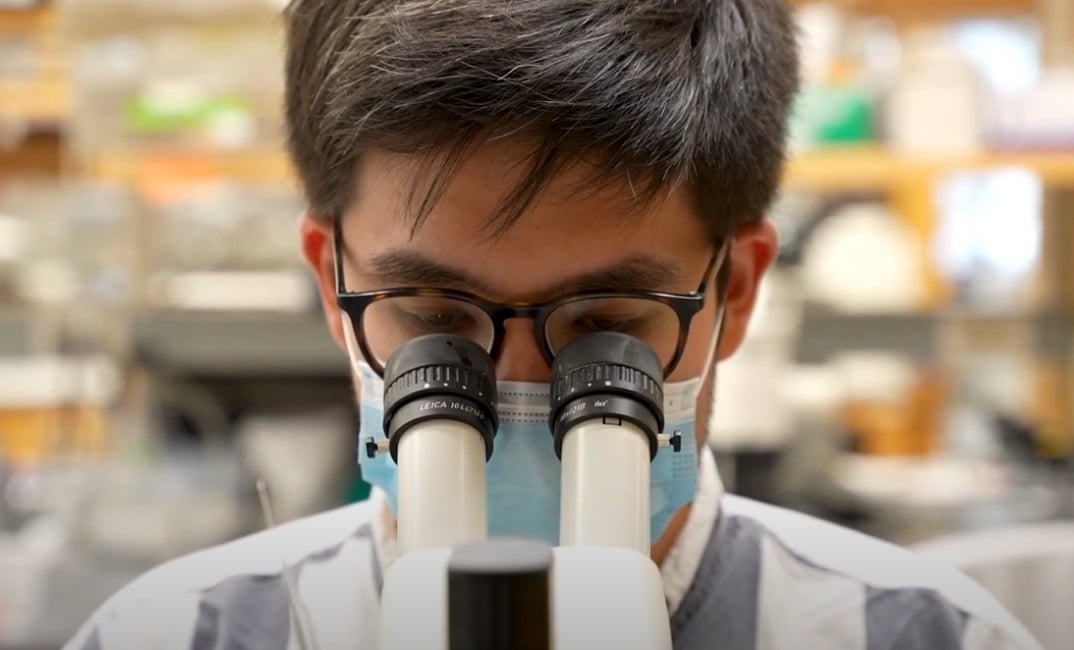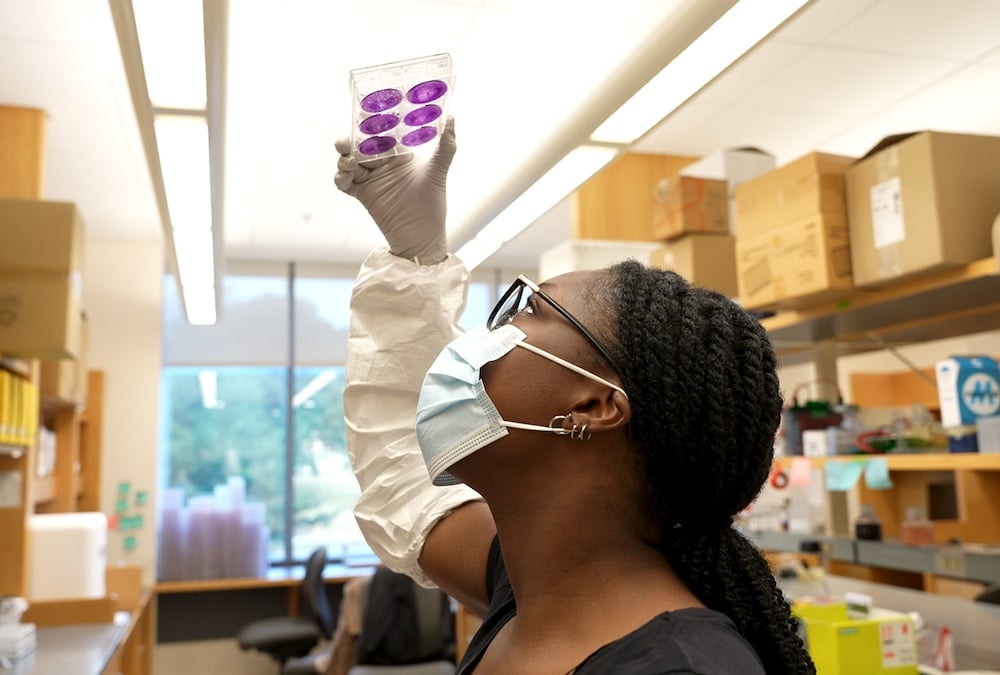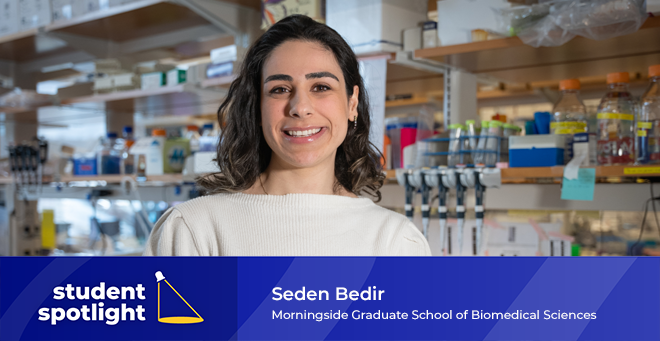Biomedical Sciences PhD
Explore, experiment and experience before deciding on your path
Immerse yourself in UMass Chan Medical School’s Biomedical Sciences PhD program, and join our collaborative, research-focused community to advance discoveries of the treatment and prevention of diseases.
As a PhD candidate at the Morningside Graduate School of Biomedical Sciences, study alongside distinguished mentors and colleagues to propel biomedical research forward, making important strides in improving modern medicine.
Discover the Biomedical Sciences PhD Program

In the biomedical sciences doctoral program, you can:
- Develop specialized skills to support your academic and professional growth
- Choose from eight programs to direct your doctoral research
- Discover your area of interest in first year research rotations
- Receive full funding, including a generous stipend and health insurance
Curriculum
Designed to promote critical thinking, problem-solving and ethical scientific research, the Morningside Graduate School of Biomedical Sciences’ curriculum provides a wide range of courses that challenge you to grow as a student, researcher and future leader in the biomedical field.
As a biomedical PhD candidate, take core courses and field-specific electives to prepare you for your thesis research and future career. Learn advanced epidemiological fundamentals and research methods, explore scientific inquiry in biomedical research, become proficient in scientific writing, design clinical trials, utilize cutting-edge qualitative and quantitative research and acquire many other skills.
Additionally, enroll in professional development and qualifying exam prep courses that equip you with the practical skills of proposal writing, data management, career exploration and how to communicate effectively in writing, graphics and orally to the scientific community.
View all courses offered in the Biomedical Sciences PhD program
Core Competencies
UMass Chan’s PhD in Biomedical Sciences program strives to develop the following core competencies in every student:
- Knowledge-based, problem-solving ability and critical thinking: identify important biomedical and/or population health problems and conduct original research.
- Communication: successfully engage in written and oral scientific discourse.
- Responsible conduct of research: students comprehend and apply ethical standards to research and decision-making.
- Professionalism and career advancement: students exhibit professional behavior and attitudes.
Program Structure
The Biomedical Sciences PhD program is structured in an umbrella pathway format, allowing you to find what path of study suits your professional and personal goals. In Year 1, you can rotate between many labs within the program to facilitate an exploratory education and find the research specialization that ignites your interest. As an incoming student, you are not limited to any one department.
During the first three years of the program, you enroll in a series of core biomedical science courses and field-specific electives that prepare you for your graduate research. You also initiate your thesis research, take your qualifying exam, and write and defend your research proposal in these beginning years
Your time in the Biomedical Sciences PhD program culminates in the public oral defense of your dissertation, during which you present your thesis research and explain its relevance and contribution to the field.
Explore your research interests
PhD Programs of Study
To foster your intellectual curiosity, you participate in up to three research rotations during the first year of your PhD program. With the support of faculty and staff, you select one of our eight programs of study that directs your research and dissertation topic.
Biochemistry and Molecular Biotechnology
In the Biochemistry and Molecular Biotechnology program, your studies focus on molecular, cellular and regulatory biochemistry, molecular biophysics, chemical biology and structural biology.
Cancer Biology
The Cancer Biology program studies biochemistry, genetics, molecular and cell biology and the clinical aspects of cancer to improve the prevention, diagnosis and treatment of human cancers.
Immunology and Microbiology
The Immunology and Microbiology program examines the molecular and cellular basis of immune responsiveness, molecular mechanisms of viral replication, host-pathogen interactions and the control of viral, bacterial and parasitic infections.
Interdisciplinary
In the Interdisciplinary program of study, you utilize a combination of approaches to biomedical research that may include classical genetics, molecular genetics, genomics/proteomics, biochemistry and light and electron microscopy.
Neuroscience
The Neuroscience program explores areas such as the neural, molecular and genetic mechanisms that underlie nervous system development, learning and memory, addiction, glial responses to neuron injury and circadian rhythmicity.
RNA Therapeutics and Biology
With the rapid evolution of RNA medicines, this interdisciplinary training program equips students with expertise in RNA biology, drug design, and translational science.
Systems, Computational, and Quantitative Biology
The Systems, Computational, and Quantitative Biology program of study works to develop and apply computation and mathematical models to biological problems, with an emphasis on the now-available, high-throughput genomic and proteomic data.
Translational Science
Translational Science focuses on discovering solutions to clinical problems by applying the power of cutting-edge biological tools.
Career Exploration
 With your doctorate in biomedical sciences, you are prepared to become a leader in all sectors of biomedicine. In your third year of study, you have the opportunity to participate in Career Pathways Communities to learn how you can contribute to academic and industry research, policy and regulatory affairs, business and commercial development and more.
With your doctorate in biomedical sciences, you are prepared to become a leader in all sectors of biomedicine. In your third year of study, you have the opportunity to participate in Career Pathways Communities to learn how you can contribute to academic and industry research, policy and regulatory affairs, business and commercial development and more.
Student Spotlight
-
 Read more
Read more -

PhD candidate studies rare form of sarcoma
Read more -

PhD candidate Winnie Mkandawire, impacted by grief and driven by hope, studies disease outbreak modeling
Read more -

PhD candidate engineers new RNA sequences to enable mRNA-based therapeutics
Read more
